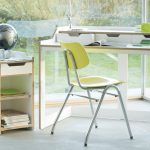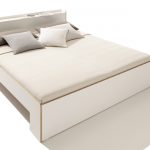Cologne Creative: Felix Stark – As a designer you always have to make it clear what you stand for
Continuing our series of posts on creativity in Cologne, historic and contemporary, we met up with product designer Felix Stark.
Born in Bonn Felix Stark initially completed a carpentry apprenticeship before studying product design at the ecosign/Akademie für Gestaltung in Cologne, where in 2004 he established his design studio “formstark“. In addition to realising projects as varied as, and amongst many others, the ARK tap and bathroom fittings collection for Spanish manufacturer Stanza, a showroom and museum design project for Toyota F1 in Cologne and numerous furniture objects in cooperation with German manufacturer Müller Möbelwerkstätten, Felix Stark advises companies on aspects of the contemporary design market in addition to teaching at a number of design schools. We met up with Felix Stark to discuss the current design market, his understanding of sustainability in context of design and the challenges in establishing your own studio, but began by asking why the decision to follow a career in design…….
Felix Stark: When I was seven or eight I announced that I wanted to be either an inventor or an artist, and my parents told me that as an artist I wouldn’t earn any money and to be an inventor I’d have to study physics, and at that age neither option really appealed to me! And then a friend of my parents suggested design, as a mixture of inventor and artist, and I instantly knew that was it!
smow blog: You still however decided to learn a trade and completed a carpentry apprenticeship…..
Felix Stark: … .exactly. I was always fairly certain that I wanted to move towards furniture design and so considered a carpentry apprenticeship a good basis from which to progress, and that proved to be the case and is something that still helps me today.
smow blog: Following completion of your apprenticeship you studied at the ecosign design college here in Cologne, why the decision for ecosign?
Felix Stark: Sustainability is an important subject for me and at ecosign sustainable thinking is an underlying component of all courses and so in that context it was a very logical decision.
smow blog: Which raises the obvious question as to what you understand by “sustainability” in terms of furniture design?
Felix Stark: I worked for a while in Hong Kong, which was a fantastic experience but I had to make an awful lot of plastic objects, and through that experience understood that such cannot be the future, where we keep making objects that a short time later end up in the rubbish dump. And thus for me the question of material choice or production process is always important, but also questions such as the lifecycle of a product, how long can one use it and extending that for as long as possible.
smow blog: And are you always able to realise projects you want in the way you want or do, let’s say, market forces and economic realities play a role in what you can ultimately achieve?
Felix Stark: Since establishing my own studio I have realised how difficult it can be to realise real sustainability, particularly, for example, when you start working with a new client and they have existing practices or insist that they have always used injection moulding and always will, then it can be difficult to convince them to try something new. And while I would never claim only to work sustainably, as a small design office I have the luxury that I can turn down projects, and have said no to projects, which contradict my understanding of how products should be. I don’t believe it is possible to say, I will only work on sustainable projects and on projects where everything corresponds to my position, but I do believe it is important to set limits.
smow blog: Small design office is a good keyword, was it always your plan to establish your own studio, or……?
Felix Stark: I actually established the studio while I was still a student and initially did so because I had a few small commissions, so events, fair stands and the like, and then came the decision, OK, it works, set up on your own. That wasn’t however a particularly clever idea and not something I’d recommend, because it costs a lot of time and money before, for example, you learn how the market functions or a how a contract should be worded. It is I believe much more sensible to find a paid position, learn how things work and then set up on your own…..
smow blog: …. but you never considered given up the office and looking for a paid position?
Felix Stark: No, it all somehow worked and I managed to muddle through, and then after the first few successes people did start approaching me with full-time job offers, but by then it was uninteresting because I was realising my projects and those products which were important to me.
smow blog: The studio exists in Cologne because you were here, but did or have you ever considered moving elsewhere?
Felix Stark: If I’m honest I have never given it any serious thought, but today it is not so important where you are based, for my clients it is irrelevant if I’m in Cologne or, for example, Berlin or Munich. I like Cologne, I’m very happy here and so the question has never arisen
smow blog: Which we take to mean that in terms of suppliers, partners, workshops etc,. Cologne offers all you need?
Felix Stark: Cologne has an established industry, and that means that when I need to get something lasered or canted or build a prototype then I have all that I need in the vicinity, that’s relatively easy.
smow blog: Cologne is also IMM. Is that something which helps promote Cologne as a “creative city” or just something which happens every twelve months and then all move on elsewhere……
Felix Stark: To be honest I’ve never really considered the question, and from my perspective can’t say that I have ever noticed any great effect. That may be to do with the fact that IMM is about orders, very dry, is all about unit numbers, delivery and payment conditions and so doesn’t radiate as, for example, Milan and consequently has a different atmosphere.
smow blog: You’ve been in business since 2004, that means at some point the muddling through proved successful, was there a specific event, perhaps a moment, where you knew, OK now things will work?
Felix Stark: I think it was more about a personal development, about finding my own position, my own direction. I don’t think I could say that since company X or Y has been in my portfolio everything has been good, but much more the success comes through this process of finding your own signature, but also understanding how the market functions.
smow blog: And in terms of that market, do you consider the current furniture market is healthy, or….?
Felix Stark: I am certainly the opinion that today ideas are very quickly appropriated, and that when something proves itself a success that other companies very quickly release products which are very similar. Which is a shame because the diversity suffers and today we have a situation where the market is very monotonous. It’s similar in a way with, for example, the auto industry, if you take the badge from a car most people wouldn’t know who the producer is, and so with furniture, when all produce similar products no manufacturer has an identity any more.
smow blog: And in terms of your studio, does that mean that over the past decade the situation has become easier, gotten harder, stayed the same…..?
Felix Stark: If anything I would say it has got more difficult, for example the price pressure from the manufacturers has become more intense, product cycles are shorter, development times are shorter and in terms of the global market there are, for example, excellent designers in eastern Europe who work for conditions far removed from those in, for example, Germany or Italy. In graphic design it is already the case that many western European companies contract their commissions to firms in Prague or Warsaw, a lot of photo editing is done in India or China, and I think that in industrial design the same will, sooner or later, arrive, that producers start looking further afield for designers.
smow blog: And how can you counteract such?
Felix Stark: I don’t think one can, I think more so it is increasingly important that as a designer you remain true to yourself, to that what defines you and don’t become hectic and try to meet a particular, perceived, market or react to each and every trend. As a designer you always have to make it clear what you stand for.
smow blog: In which context, and going slightly back to where we were earlier, you also teach, if a student comes to you and asks if you think they should open their own studio, how would advise them?
Felix Stark: I would certainly advise them to first of all look for a paid position, or at least a longer term internship where they are actively involved in all the processes. The decision as whether then to set up on your own is then for me one of character. In my case I am always thinking about design and projects and so in effect have no “work hours”, I am in a way always working, and so for me it makes sense to be self-employed. Others can switch off, or want to, want a nine-to-five then off home, and for them a permanent position is perhaps more appropriate, does however mean accepting the giving up a certain degree of control over a design or the direction of a project. But that is ultimately a personal decision that each has to make for themselves.
smow blog: Changing tact slightly, one of your highest profile co-operations is with Müller Möbelwerkstätten, how did the cooperation with Müller Möbelwerkstätten arise?
Felix Stark: Cold calling. I sent them a proposal for a bed and had the good fortune that that was at just the point when they were deciding the time was right to bring some new products into their portfolio, were looking for some fresh ideas and new designers. I think it also helped greatly that their stylistic ideas reflect exactly that which I like to create, so a reduced design with an integral added value, and so we had a good basis for the cooperation.
smow blog: And in that sense was the plan the always to develop Plane as a collection, or……?
Felix Stark: No, not as such that was something which developed organically. The bed came first, was a success and then we decided to that it would make sense to compliment the bed with a wardrobe, and then came the Secretary and so has the collection developed over time.
smow blog: And briefly to end, is your plan to stay with furniture or are you looking for new directions, new areas?
Felix Stark: Furniture yes, however I’d really like to do something in context of hotel or bar design. In the past I have undertaken small club projects, but never to a quality where I was especially happy, largely because the clients always wanted something quick and so there was a lot of compromising. And so a high-quality bar or hotel project would be something which I would very much enjoy, and which is still furniture design, albeit on a larger scale and where it is not just about the furniture but the whole ambience.
Full details on Felix Stark and his work can be found at http://formstark.com/
- Plane Secretary and Mobile Container by Felix Stark for Müller Möbelwerkstätten
- “Z” DJ Pult by Felix Stark for RedBull
- Part of the Ark Collection by Felix Stark for Stanza
- Sphere by Felix Stark, an adaptable tent system for crises regions
- Nook Bed by Felix Stark for Müller Möbelwerkstätten
- Starkbox by Felix Stark for Magazin
Tagged with: cologne, Felix Stark, köln, Müller Möbelwerkstätten





